Is it Possible to Refinance During Chapter 13 Bankruptcy?
Yes, refinancing during Chapter 13 bankruptcy is possible! Many homeowners think they must wait until after bankruptcy to refinance, but that’s not true. FHA and VA loans allow refinancing during an active repayment plan, but you must meet lender and court requirements.
At Gustan Cho Associates, we specialize in helping borrowers refinance during Chapter 13 bankruptcy—even when other lenders say no. This guide explains how to refinance, loan options, and how to get approved quickly.
How Can I Get Out of Chapter 13 Early?
[embedythttps://youtu.be/jLjm6fSCHP4[/embedyt]
If you want to exit Chapter 13 early, you have a few options:
- Pay off your repayment plan early (only if allowed by the court)
- Request a hardship discharge (if you face financial setbacks like job loss or medical issues)
- Convert to Chapter 7 (only if you qualify based on income)
- Refinance your mortgage (use home equity to pay off your remaining balance)
Many homeowners look into refinancing during Chapter 13 bankruptcy. This means they are trying to get a new loan to take out some of the value they have built in their homes. By doing this, they can use that money to pay off their bankruptcy plan sooner. It’s a way to manage their finances better and get things straightened out more quickly.
Want to Exit Chapter 13 Sooner?
Apply Online And Find Out If You Qualify for Early Discharge
Can You Finance a House While in Chapter 13?
Yes, you can! If you want to buy a new home while in Chapter 13, here’s what you need:
- 12+ months of on-time Chapter 13 payments
- Trustee approval (your bankruptcy court must allow the purchase)
- FHA or VA loan approval (Conventional loans typically require bankruptcy discharge)
In Chapter 13 bankruptcy, VA and FHA loans are unique because they let you refinance your current loan. This means you can lower your payments or get a better interest rate in bankruptcy. Plus, these loans can help you buy a home before your bankruptcy is fully discharged. So, if you’re considering refinancing during Chapter 13 bankruptcy, these might be your options.
Is Refinancing During Chapter 13 Bankruptcy Possible with FHA?
If considering refinancing during Chapter 13 Bankruptcy, you should know that it’s possible to qualify for an FHA refinance or purchase loan even while you’re still in bankruptcy. This means you can still make your financial plans work while getting a new loan as long as you meet these requirements:
- 12 months of on-time bankruptcy payments required
- Manual underwriting required
- Minimum credit score of 580
- Debt-to-income ratio limits apply
- Court/trustee approval required
Under HUD guidelines, borrowers are eligible to qualify for an FHA Loan one year into a Chapter 13 Bankruptcy Repayment Period. However, many lenders have overlays. Many lenders have overlays (extra restrictions), but Gustan Cho Associates has no lender overlays, which means we approve loans based on FHA guidelines only.
What Gets Discharged in Chapter 13?
Once you complete your Chapter 13 repayment plan, eligible debts are discharged. These typically include:
- Credit cards
- Medical bills
- Personal loans
- Unsecured debts
However, mortgages and car loans are not discharged, so refinancing during Chapter 13 bankruptcy can help you restructure debt before completing your plan.
Is It Hard to Get a Loan After Chapter 13?
Not necessarily! If you’re looking to buy a home, you might think filing for Chapter 13 bankruptcy would stop you from getting a mortgage for a long time. But that’s not the case with FHA and VA loans. These types of loans let borrowers secure a mortgage right after their Chapter 13 bankruptcy is discharged, meaning there’s no waiting period!
In fact, many homeowners take advantage of the opportunity by refinancing during Chapter 13 bankruptcy. This allows them to lock in a better interest rate before their bankruptcy case is fully finished. So, if you’re in this situation, don’t lose hope—you have options.
Want to End Your Chapter 13 Plan Early?
Apply Online And Find Out What Steps You Need to Take
Can You Modify Your Loan While You are in Chapter 13 Bankruptcy?
Yes, but many homeowners choose to refinance over loan modification because:
- Refinancing gets better loan terms
- FHA and VA loans allow cash-out options
- You don’t need lender approval like with modifications
If your current mortgage is too expensive, refinancing during Chapter 13 bankruptcy might be the better solution.
What is the Repayment Period for Chapter 13?
Chapter 13 repayment plans usually last 3 to 5 years, and the exact length depends on several important factors.
First, it often hinges on your income—if you have a higher income, you might be looking at a 5-year plan. Second, your total debt amount can significantly affect how long you will be in repayment. Finally, you’ll need to get approval from the court, which will consider all of these factors.
Many homeowners consider refinancing during Chapter 13 bankruptcy a smart move. This strategy can help them rearrange their finances, which might allow them to pay off their debts faster and avoid the long-term commitment of making payments for several years.
Can You Discharge a Mortgage in Chapter 13?
Filing for Chapter 13 Bankruptcy does not mean your mortgage has been settled. You still have to keep making payments on it. If you stop, the bank can still take your home. It’s important to understand that your lender still has rights, and you need to stay on top of your mortgage payments.
However, you can refinance your mortgage to lower payments, switch to a fixed-rate loan, or cash out equity while in Chapter 13.
Does Chapter 13 Take Your Savings?
When thinking about Chapter 13 bankruptcy, many wonder if it will affect their savings. In most cases, the answer is no; your savings generally won’t be taken away. However, the court might look closely at any large amounts of money you saved.
If it appears that you have more than what is needed for emergencies, the court could suggest that this money should be used to pay off your debts.
A common strategy for borrowers in this situation is refinancing during Chapter 13 bankruptcy. This means adjusting your loans to get better terms or lower payments, which helps you keep your savings intact. Doing this lets you focus on paying down your debts without losing the financial cushion you’ve built up.
How to Get Started
If you’re considering refinancing during Chapter 13 bankruptcy, we can help. At Gustan Cho Associates, we specialize in FHA and VA loans for borrowers in active bankruptcy.
Call or text us today at 800-900-8569 or email alex@gustancho.com to see how much you can save! No lender overlays – Just agency guidelines! Fast closings – Get approved in as little as 30 days!
Need Lower Mortgage Payments During Chapter 13?
Apply Online And Find Out If Loan Modification Is an Option
Frequently Asked Questions About Refinancing During Chapter 13 Bankruptcy:
Q: Can I Refinance My Home While in Chapter 13 Bankruptcy?
A: Yes! Refinancing during Chapter 13 bankruptcy is possible with FHA and VA loans. You must have made at least 12 months of on-time bankruptcy payments, get court approval, and meet lender requirements.
Q: Do I Need Trustee Approval to Refinance During Chapter 13?
A: Yes, your bankruptcy trustee must approve your refinance. Lenders require a court-approved letter showing that refinancing will improve your financial situation.
Q: What Type of Loan Can I Use to Refinance in Chapter 13?
A: FHA and VA loans allow refinancing during Chapter 13 bankruptcy. Conventional loans typically require you to wait until after your bankruptcy is discharged.
Q: Can I Get Cash-Out Refinancing While in Chapter 13 Bankruptcy?
A: Yes! FHA and VA loans allow cash-out refinancing during Chapter 13 bankruptcy. You can use home equity to pay off your bankruptcy or other debts.
Q: How Long do I have to Wait After Filing for Chapter 13 to Refinance?
A: You must have made at least 12 on-time bankruptcy payments before you can refinance. However, you don’t need to wait until your bankruptcy is discharged.
Q: Will Refinancing Remove My Chapter 13 Bankruptcy from My Credit Report?
A: No, your bankruptcy will still appear on your credit report until it is removed after 7 years. However, refinancing can help improve your credit score over time.
Q: How does Refinancing During Chapter 13 Bankruptcy Affect My Mortgage Payments?
A: Refinancing can be a strategic avenue for reducing borrowers’ interest rates, which in turn can lead to decreased monthly payments and overall expenses. When considering refinancing during Chapter 13, borrowers can switch from an adjustable-rate mortgage (ARM) to a fixed-rate mortgage.
Q: What Credit Score do I Need to Refinance During Chapter 13 Bankruptcy?
A: FHA loans usually require 580 minimum credit score for accessibility, while VA loans have no specific score requirement but need lender approval for flexibility.
Q: Can I Refinance with Late Payments on My Bankruptcy Plan?
A: No, lenders require 12 months of on-time payments during Chapter 13 before they approve a refinance.
Q: How Can I Start the Refinancing Process During Chapter 13 Bankruptcy?
A: Contact Gustan Cho Associates today! We specialize in refinancing during Chapter 13 bankruptcy, offering fast approvals with no lender overlays. Call us now to see how much you can save!
This blog about “Refinancing During Chapter 13 Bankruptcy Repayment Plan” was updated on February 17th, 2025.


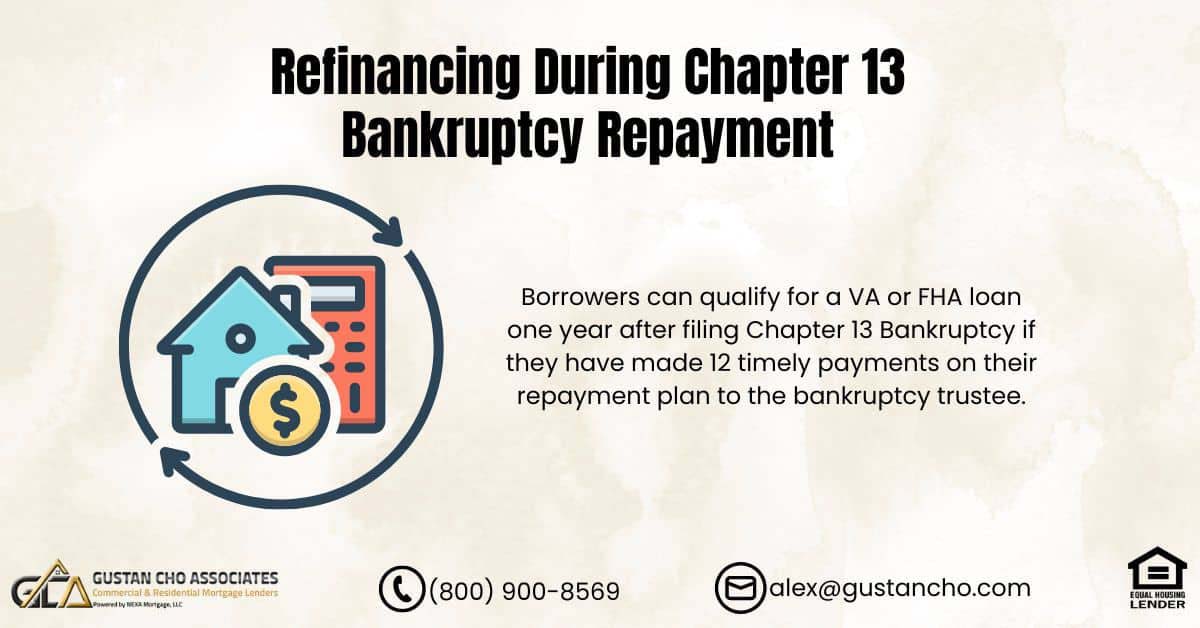
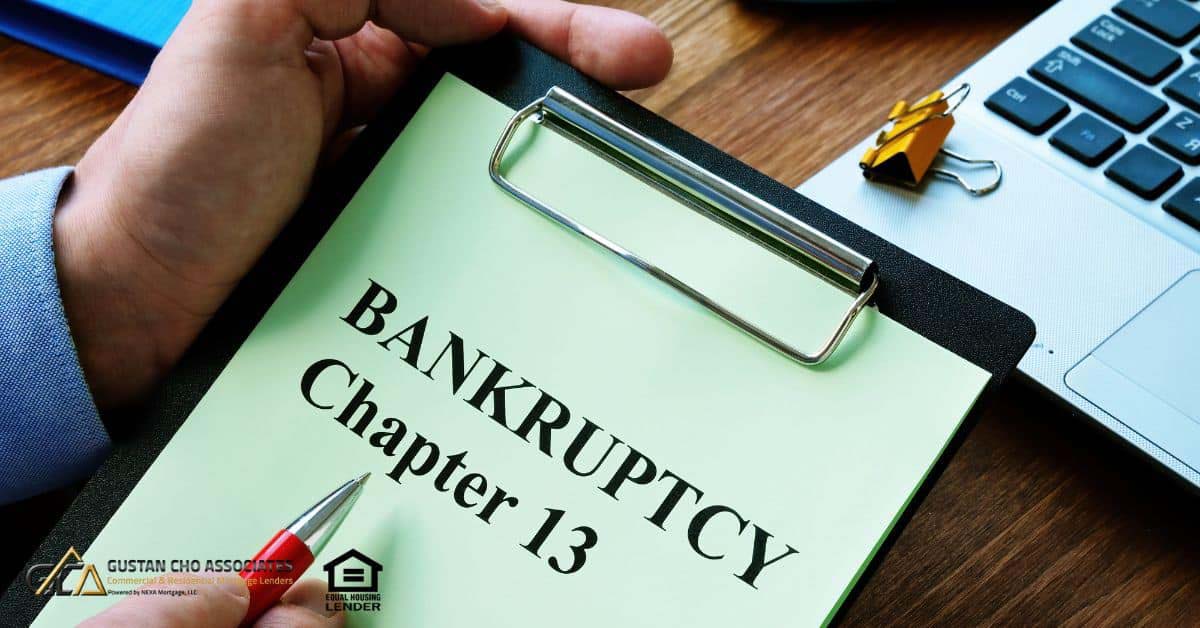



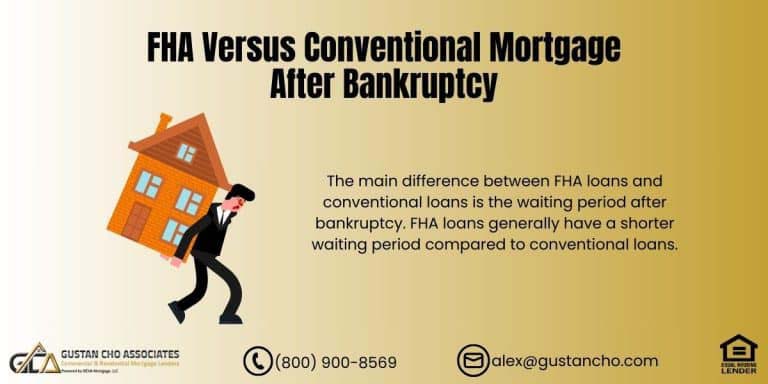

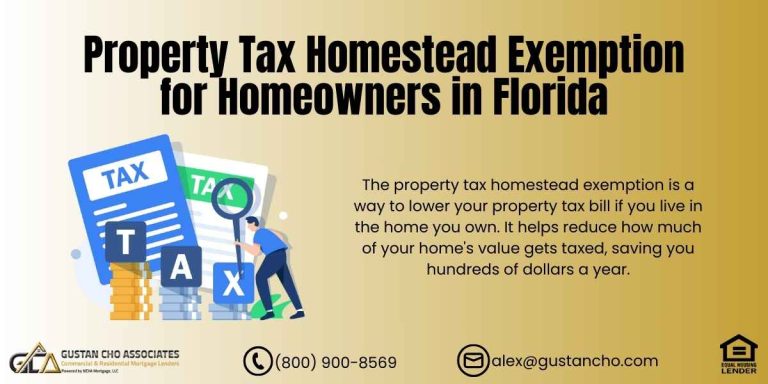
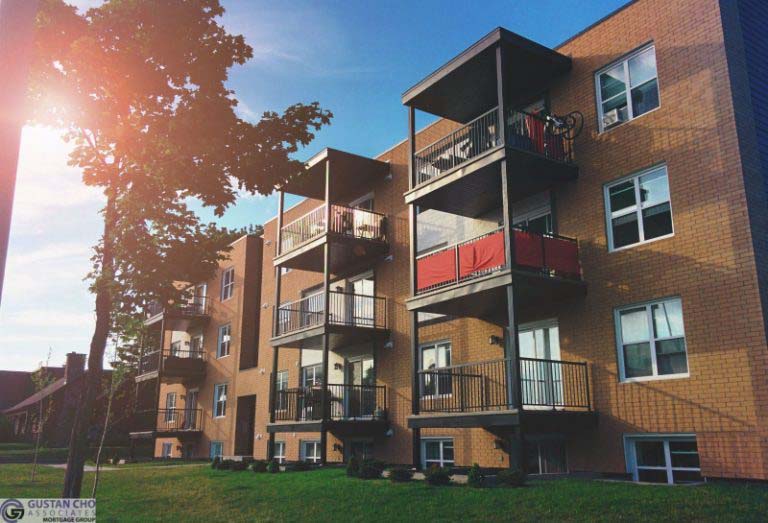

i am interested in a refi while in chapter 13
You came to the right place. Can you please email us your contact information at gcho@gustancho.com or call us at 262-716-8151 or text us for a faster response.
Interested in possible assist to re-finance. I have a Chpt 13 that I am paying. Thank you. I reside in Alabama. Would like to get a new mortgage company if possible.
We are licensed in Alabama and we can help you refinance during the Chapter 13 Bankruptcy repayment period without your bankruptcy being discharged. Please reach out to us at gcho@gustancho.com or call us at 262-716-8151 or text us for a faster response.
Hi! We are in a chapter 13 thanks to Covid and the judge actually suggested trying to find a mortgage company to refi our mortgage. We are in Tennessee. Is that something for which you guys can direct us?
Good afternoon Nikki. We are licensed in Tennessee and can help you refinance your home mortgage during Chapter 13 bankruptcy repayment period without your Chapter 13 Bankruptcy being discharged. Please reach out to us at gcho@gustancho.com or call us at 262-716-8151 or text us for a faster response.
I’m also interested in refinancing while in Ch. 13 in Indiana. 14 yr. home residence. Same loan, different lender (original lender previously bought out). Please email me with information I may need and that you would need. Thank you.
Please email us your contact information at gcho@gustancho.com or contact us at 262-716-8151 or text us for a faster response.
I too am in a Chapter 13 right now and my attorney has also said if I can get a refinance it would help me out financially. I am in New Mexico can you please assist me.
Please reach out to us at gcho@gustancho.com
Are you licensed in Florida?
Yes, we are licensed in Florida. Please reach out to us at 262-716-8151 or text us for a faster response. Or email us at gcho@gustancho.com.
Are you licensed in Oregon?
Our Oregon license is pending. I can refer you to one of our associates who is licensed in Oregon.
Good day, are you licensed in NY? I am looking to refi out of Chapter 13.
Unfortunately, we are not licensed in New York.
I’m interested to see if I can do a cash out refinance on my FHA loan to pay off my active chapter 13 bankruptcy. Is that type of thing possible?
As long as you have been in your Chapter 13 bankruptcy repayment plan for at least twelve months, you can do a cash-out refinance up to an 80% LTV on an FHA loans.
Are you licensed in PA?
Yes, we are licensed in Pennsylvania. Please reach out to us at gcho@gustancho.com or call us at 262-716-8151. Or text us for a faster response.
Are you licensed in the state of Washington?
Yes, we are license in Washington.
Hello I am also in a chapter 13 will be finished in4 months. Looking to refinance with cash out. Is that possible and are you licensed in Maryland
Absolutely. And we are licensed in Maryland. Can you please email us your contact information at gcho@gustancho.com.
are you licensed in Arizona? i want to do a cash out and refi
We can refer you to one of my associate Mike Gracz. Please reach out to us at gcho@gustancho.com.
We are in a current Ch. 13 plan and want to refi with cash out to pay off our Ch. 13 plan as well as some much needed home repairs. We reside in California. Would you be able to assist?
We can help you. Please contact us at gcho@gustancho.com.
Are you licensed in Massachusetts?
Unfortunately, we are not licensed in Massachusetts
I reside in Alabama and I am currently in Chapter 13. I have remarried since filing Chapter 13 and my husband is interested in and trying to refinance our home in just his name. Is this possible? Is it possible to be on the refinance with him or are my chances slim to none due to my Chapter 13? He is trying to refinance to lower the monthly payment and also pay off debtor’s court. Any information would be greatly appreciated.
We can help you. Can you please reach out to us with your contact information at gcho@gustancho.com or call us at 262-716=8151. Looking forward to working with you and your family.
i’am in chapter 13 and was thinking about refi with cash out to pay my chapter 13 off . i need cash for new heat pump for example . if you can help me please thank you
James can definitely help you in getting a cash out refinance during your Chapter 13 bankruptcy repayment plan and you can use the proceeds to pay the outstanding balance off. Please email us your contact information at gcho@gustancho.com along with your phone number. What state you in? Looking forward to working with you and your family.
Hi, Gustan
I am in Florida, I just start to make payment to my chapter 13 repayment plan, can I refinance after 12 months of making on-time payments for 12 consecutive months?
Thanks, Marcos
You need to wait the 12 months seasoning and payments.
looking for a first-time home loan but my partner and i have less than perfect credit. I have been working on my credit but it is taking longer than expected.
Are you guys licensed in New Jersey?
Yes, we are licensed in New Jersey. Please reach out to us with your contact information at gcho@gustancho.com or call us at 262-716-8151. Text us for a faster response.
I have a outstanding student loan, would this disqualify me from refinancing while in a bankruptcy?
Is it being paid timely and if not, is it a private loan?
Are you license in Virginia?
Yes, we are licensed in Virginia. Please email us your contact information at gcho@gustancho.com or call us at 262-716-8151. Text us for a faster response.
Are you licensed in WI, if so what’s the process to review my info?
Yes, we are licensed in Wisconsin. Please email us your contact information at gcho@gustancho.com or call us at 262-716-8151. Text us for a faster response.
I am interested in refi my home and currently in year 3 of a chapter 13. Do you know any companies who can help in Texas?
We can help you. Please email us your contact information at gcho@gustancho.com or call us at 262-716-8151. Text us for a faster response.